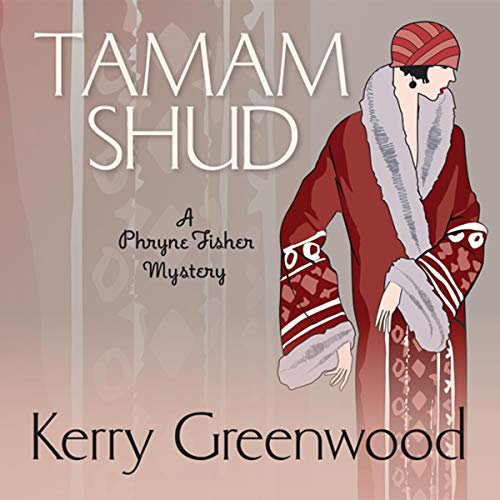 Tamam Shud: A Phryne Fisher Mystery by Kerry Greenwood
Tamam Shud: A Phryne Fisher Mystery by Kerry Greenwood Narrator: Kirsty Gillmore
Format: audiobook
Source: purchased from Amazon
Formats available: audiobook
Genres: historical fiction, historical mystery, mystery
Series: Phryne Fisher
Length: 59 minutes
Published by Audible Audio, Isis Publishing Ltd on February 12, 2021
Purchasing Info: Author's Website, Publisher's Website, Amazon
Goodreads
1948. After serving with the French Resistance during the Second World War, codenamed La Chatte Noire, Phryne Fisher escaped to Australia in search of sunshine, butter and peace. So she’s furious when tragedy intrudes upon her newfound tranquillity and she discovers a dead man on Somerton Beach - well-dressed, good-looking and with a secret smile on his lips. The police are baffled as to his identity and cause of death - not to mention the scrap of paper bearing the words TAMAM SHUD found upon him, and the coded message in the book from which it was torn. But WPC Hammond knows Phryne’s fame as a detective. And Phryne telephones her old friend Bernard Cooper, who spent the war at a place called Bletchley, doing something awfully top secret involving codes....
My Review:
The mystery at the heart of this Phryne Fisher story really happened. Somerton Man, as the unidentified corpse came to be known, really was discovered on the beach at Somerton Park, a suburb of Adelaide, South Australia, on December 1, 1948. To this day, his identity is still uncertain, although a likely candidate was finally determined just last year. JUST last year.
The body was not discovered by Phryne Fisher, although, considering Phryne’s wartime service in both World Wars, and the conclusion that she and her friends both in and out of the Intelligence services eventually reached, if Phryne or someone like her had been involved, or if Somerton Man, whoever he was, had himself been in the spy game, it would have been a secret that a whole lot of people would have taken to their graves.
And perhaps did.
During the course of the Phryne Fisher series, at least so far, Phryne’s date of birth is left deliberately vague. She claims to be in her late 20s – or thereabouts – in the late 1920s setting of the series so far – even though her first-person voice and her vast experience do make one wonder more than occasionally.
In Tamam Shud we finally learn, definitively, that Phryne was ‘born with the century’. In this case the 20th century, making Phryne 48 in this story that takes place after her World War II service, just as the series as a whole takes place after her service as an ambulance driver during World War I and in the intelligence services post-war.
Which makes her a contemporary of Mary Russell, the partner and wife of Sherlock Holmes in Laurie R. King’s series. A reference that seems more apt than it otherwise might, as Tamam Shud has a bit of the feel of the final canonical Sherlock Holmes story, His Last Bow.
So Tamam Shud has the feeling of Phryne’s swan song, as it takes place much later in her life than the author had ever planned to portray, and the Phryne in this tale, as well as the world she inhabits, is in a much different place than during the more lighthearted ‘Roaring 20s’.
Phryne’s gang has broken up, or dispersed over the intervening years. She’s on her own in Adelaide, and rather than calling upon Detective Inspector Jack Robinson, the redoubtable Mr. Butler, or even Bert and Ces, once Phryne gets her teeth into this case she calls upon the resources she accumulated during her years in the French Resistance, including her handlers in British Intelligence.
Phryne, or Le Chat Noir as she was during the war, is not quite who she once was, which she recognizes with more than a touch of both rue and chagrin. But she is still a force to be reckoned with while hunting down a truth that some would prefer remain a mystery.

Escape Rating A-: To love this short, bittersweet story it is probably necessary to know Phryne Fisher as the books portray her. There’s not enough time to get into the depth necessary to introduce new readers to this beloved character. But for those who already love Phryne, it’s a special treat.
Rather than the ‘portrait of the detective as a young woman’ we have in the book series, this is the portrait of who that young woman has become after 20 years of hard choices and a second war on the heels of the first. So there’s an element here of Phryne proving to herself that she’s still got it when it comes to ferreting out the solution to the mystery.
There’s also a sense of her finally emerging from a post-war slough of despond and coming back to life and back to her truest self – even if that self is a little longer in the tooth than she ever imagined she’d be. Or at least than she ever imagined that she’d look.
The mystery in Tamam Shud ends up being more interesting than fun the way that many of the puzzles that Phryne solves in the books turn out to be. And that seems right, both out of a bit of respect for the very real unsolved mystery at its heart – and for the fact that Phryne is older, sadder and perhaps wiser. Or simply a bit more cognizant that the world isn’t what it was and neither is she.
Also, this is very, very short. Coming to it as someone familiar with the books, it seemed like the story barely sketched Phryne and focused on the unsolved mystery. Which wrapped up rather quickly. (As it would if the government were hushing up post-war spy games.) It does end in hope that Phryne has discovered a new lease on life.
It’s always a treat to spend time with this character, making this short, bittersweet audiobook into something a bit more special for this reader than either its length or its depth possibly warrant.
Reviewer’s note: This version of the story seems to only be available in audio. The paperback/ebook is an entirely different book about the same case, the author’s attempt to solve the mystery from her own first-person perspective rather than Phryne’s. Phryne’s version of the story came later, for inclusion in a collection of stories about fictional detectives solving real historical mysteries titled True Detective, which I have attempted to locate to no avail.

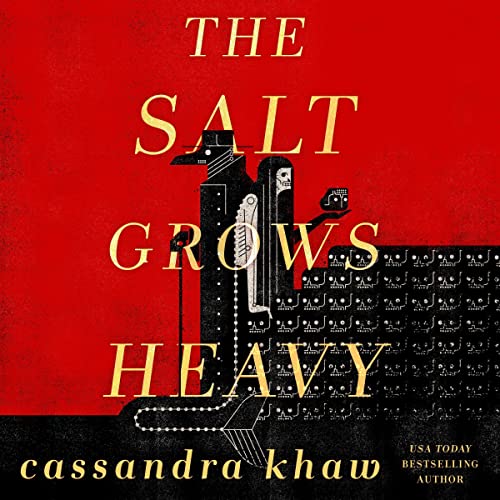 The Salt Grows Heavy by
The Salt Grows Heavy by 
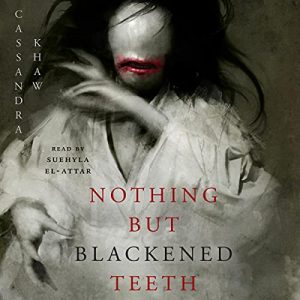 It wasn’t quite as cohesive a story as
It wasn’t quite as cohesive a story as 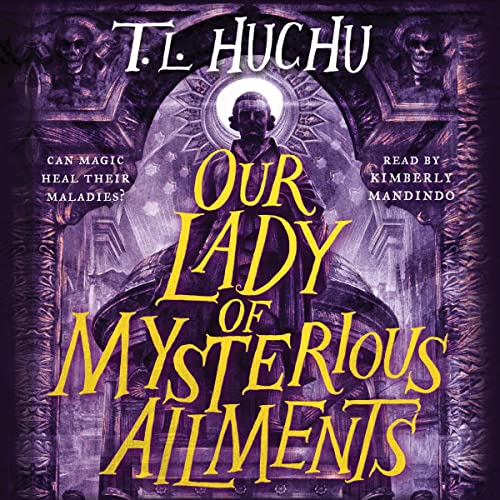 Our Lady of Mysterious Ailments by
Our Lady of Mysterious Ailments by  Escape Rating A+: Our Lady of Mysterious Ailments is just like
Escape Rating A+: Our Lady of Mysterious Ailments is just like 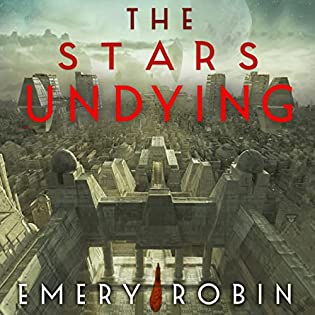 The Stars Undying (Empire Without End, #1) by
The Stars Undying (Empire Without End, #1) by 
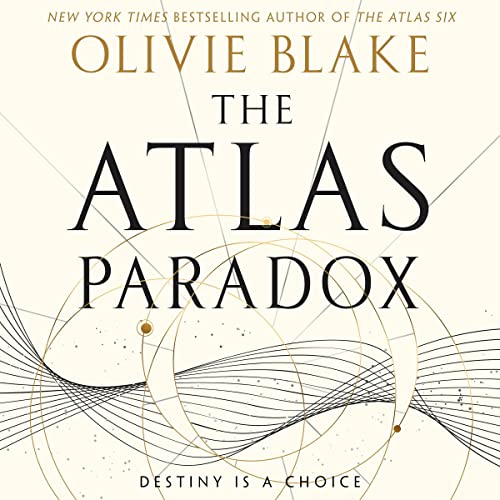 The Atlas Paradox (The Atlas, #2) by
The Atlas Paradox (The Atlas, #2) by  This story of dark academia, utter corruption and potentially the end of the world follows directly after the events of
This story of dark academia, utter corruption and potentially the end of the world follows directly after the events of  The Atlas Six
The Atlas Six Junkyard War (Shining Smith #3) by
Junkyard War (Shining Smith #3) by  But Shining is not the only human queen, because every true hero – especially if that’s not remotely what they want to be – creates their own archenemy – or the other way around. Clarisse Warhammer targeted Shining all the way back in
But Shining is not the only human queen, because every true hero – especially if that’s not remotely what they want to be – creates their own archenemy – or the other way around. Clarisse Warhammer targeted Shining all the way back in  Which means two things. First, the books pile layer upon layer building Shining’s world, so you really need to start at the beginning in
Which means two things. First, the books pile layer upon layer building Shining’s world, so you really need to start at the beginning in 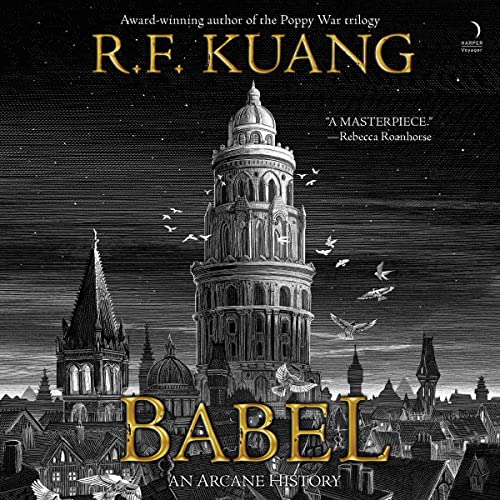 Babel, Or the Necessity of Violence: An Arcane History of the Oxford Translators' Revolution by
Babel, Or the Necessity of Violence: An Arcane History of the Oxford Translators' Revolution by  In a work of historical fantasy, particularly one that cleaved so close to this period, those evils would be impossible to ignore and no reader should expect them to be ignored. But Babel is fiction, which means I also went into it expecting a story to be told that would captivate me – and in this particular case captivate me every bit as much as the author’s
In a work of historical fantasy, particularly one that cleaved so close to this period, those evils would be impossible to ignore and no reader should expect them to be ignored. But Babel is fiction, which means I also went into it expecting a story to be told that would captivate me – and in this particular case captivate me every bit as much as the author’s 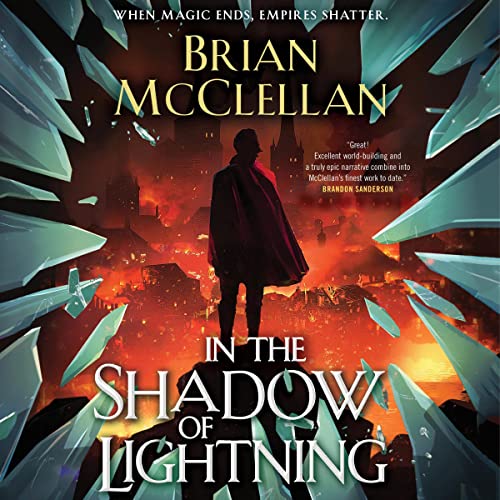 In the Shadow of Lightning (Glass Immortals, #1) by
In the Shadow of Lightning (Glass Immortals, #1) by 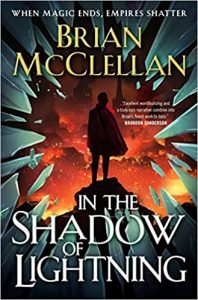 Escape Rating A+: “Glassdamn.” It rolls easily through the mind, or trippingly off the tongue, as though it’s an epithet that we’ve always used – or at least could have if we’d had a mind to. And glassdamnit but this is a terrific story.
Escape Rating A+: “Glassdamn.” It rolls easily through the mind, or trippingly off the tongue, as though it’s an epithet that we’ve always used – or at least could have if we’d had a mind to. And glassdamnit but this is a terrific story.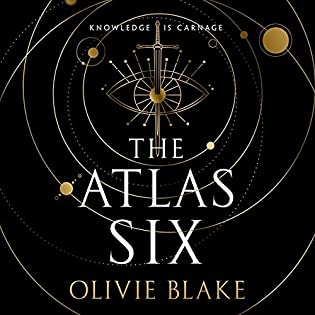 The Atlas Six (The Atlas, #1) by
The Atlas Six (The Atlas, #1) by 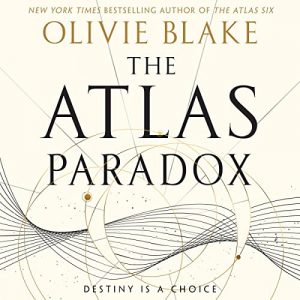 Which admittedly does ramp up the tension VERY dramatically for the second book in the series,
Which admittedly does ramp up the tension VERY dramatically for the second book in the series, 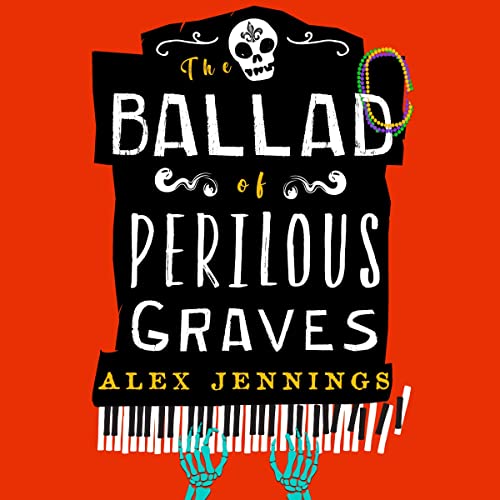 The Ballad of Perilous Graves by
The Ballad of Perilous Graves by 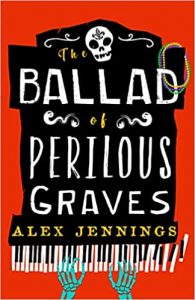 Escape Rating A-: I am a sucker for stories about New Orleans so I was all set to love The Ballad of Perilous Graves. Which in the end I did, although it took awhile to get me there. This is one of those books where the audiobook, as read by Gralen Bryant Banks, carried me over to the point where the story got its hooks into me and didn’t let go.
Escape Rating A-: I am a sucker for stories about New Orleans so I was all set to love The Ballad of Perilous Graves. Which in the end I did, although it took awhile to get me there. This is one of those books where the audiobook, as read by Gralen Bryant Banks, carried me over to the point where the story got its hooks into me and didn’t let go.